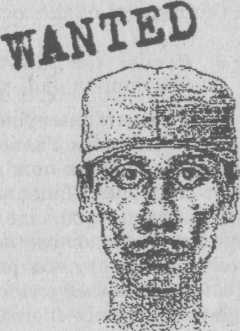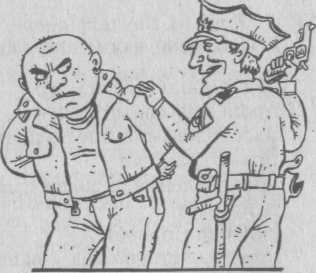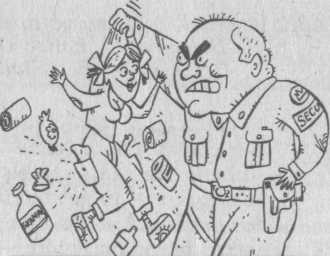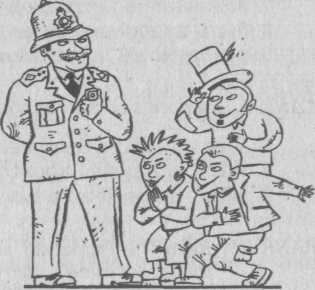Just_English_2 часть. Just English. Английский для юристов 43
 Скачать 1.96 Mb. Скачать 1.96 Mb.
|
|
74 Just English. Английский для юристов Chapter III. Law Enforcement 75  Полицейские подразделения Англии и Уэльса подведомственны органам местной полиции. Столичная полиция находится в подчинении у Министра внутренних дел. Подразделения в областях возглавляют главные констебли. Они несут ответственность за свою работу перед центральными полицейскими органами, которые назначают начальника полиции и его помощника. Комиссар Столичной полиции и его непосредственные подчиненные назначаются по рекомендации министра внутренних дел. Полицейские подразделения Англии и Уэльса подведомственны органам местной полиции. Столичная полиция находится в подчинении у Министра внутренних дел. Подразделения в областях возглавляют главные констебли. Они несут ответственность за свою работу перед центральными полицейскими органами, которые назначают начальника полиции и его помощника. Комиссар Столичной полиции и его непосредственные подчиненные назначаются по рекомендации министра внутренних дел.TASK 4. Complete the following text with the words and phrases from the box: walkie-talkie, plain clothes, detective, uniform, policeman, police force, rank, join Alan is now old enough and tall enough to the At first, of course, he'll be an ordinary of the lowest . He'll wear a and go out in the streets keeping in touch with the police station with his • Then he'd like to be a in investigating serious crimes.  TASK 5. Look at the picture and read the police bulletin: Crime: Armed Robbery Location: South & South Park Streets Date: November 13, 1999 The public's assistance is requested in identifying the person or persons responsible for an armed robbery on the southwest corner of the South St. and South Park St. intersection. This crime occurred at 9:30 a.m. on November 13, 1999. jumped in front of the victim, pulled a knife from his jacket and said, At about 9:30 a.m. the victim, a young visitor to the city, was walking south along South Park St. At the southwest corner of South Park St. and South St., the suspect "Give me your purse or you're stuck!" The victim handed it over and the suspect fled the scene of the crime. The suspect is described as a white male, 20—25 years old, medium build, 5'2", moustache, blue eyes, short brown hair, pointed nose. He was wearing a red baseball cap with a Montreal Canadians logo, a dark blue jacket, green jeans and white sneakers. This man is armed and therefore dangerous. If you can identify the man in the photofit picture, or have any information on this or any crime, contact the local Police Department or Crime Stoppers at 1-800-555-8477, and you may be eligible for a cash reward. TASK 6. Find in the text above the English equivalents for the following words and expressions:
TASK 7. Find in the text the description of the criminal and compose an opposite one: e.g. "The suspect is described as black, very tall..." Use some of the expressions given below: FACE — long, round, oval, thin, plump, fleshy, puffy, wrinkled, pasty, pimpled, pock-marked, clean-shaven FEATURES — clean-cut, delicate, forceful, regular / irregular, large, small, stern COMPLEXION — fair, pale, dark, sallow HAIR — curly, wavy, straight, receding (scanty), rumpled, shoulder-length, medium-length, short-cut, crew-cut, bobbed, dyed, bald, fair /dark-haired FOREHEAD — high, low, narrow, square, broad EYES — hollowed, bulging, close-set, deep-set, sunken, wide- apart, crossed-eyed EYEBROWS — thin, thick, bushy, arched, pencilled, shaggy EARS — small, big, jug-eared NOSE — prominent, straight, pointed, hooked, flat, aquiline, snub-nosed LIPS — full, thin, painted, cleft lip TEETH — even / uneven, sparse, artificial CHEEKS — plump, hollow, ruddy, stubby CHIN — square, pointed, double, massive, protruding Chapter III. Law Enforcement Just English. Английский для юристов 76 B  EARD — full, bushy, spade beard, grey-bearded, heavy-bearded MOUSTACHE — thin, thick, tooth brush, walrus HEIGHT — tall, short, of medium height BUILT — average, medium built, well-built, plump, skinny DISTINGUISHING FEATURES — birth marks, freckles, scars, wooden leg, humpback, pot-belly EARD — full, bushy, spade beard, grey-bearded, heavy-bearded MOUSTACHE — thin, thick, tooth brush, walrus HEIGHT — tall, short, of medium height BUILT — average, medium built, well-built, plump, skinny DISTINGUISHING FEATURES — birth marks, freckles, scars, wooden leg, humpback, pot-bellyTASK 8. Translate the following police bulletin into English and make the corresponding photo fit: ПХ РАЗЫСКИВАЕТ МИЛИЦИЯ Второй: На вид 40 лет, рост 175— 180 см, плотного телосложения, волосы светлые, вьющиеся до плеч, лицо овальное, нос курносый, брови густые. Был одет: темная удлиненная кожаная куртка, темные брюки. Любую имеющуюся информацию просьба сообщить по телефону 222-33-22, или 02. Разыскиваются преступники, совершившие убийство 21 сентября в доме номер 99 по проспекту Мира. Первый: На вид 30 лет, рост 170— 175 см, худощавого телосложения, волосы черные прямые, лицо круглое, нос прямой, глаза слегка навыкате. Был одет: темная короткая кожаная куртка, светлые брюки, коричневые ботинки. Носит темные очки в металлической оправе. Just for Fun A beautiful blonde walked into a Chicago police station and gave the desk sergeant a detailed description of a man who had dragged her by the hair down three flights of stairs, threatened to choke her to death and finally beat her up. "With this description we'll have him arrested in no time," said the desk sergeant. "But I don't want him arrested", the young woman protested. "Just find him for me. He promised to marry me." Can you describe the individual? He was about medium height and had a beard. Was this a male or female? 77 ROLE-PLA Y Identify the Suspect! There have been a string of bank robberies in the local area recently. Police are investigating the crimes and making the photofits of the suspects. Work in pairs. Each pair should consist of a police inspector and a witness: STEP 1. The police inspector is questioning the eyewitness to find out all the necessary details of the suspect's appearance. STEP 2. Using the information obtained they make up a photofit by completing the drawings below.  U  NIT 3. POLICE POWERS NIT 3. POLICE POWERSTASK 1. Read the text and translate words and expressions given in bold type in writing: The powers of a police officer in England and Wales to stop and search, arrest and place a person under detention are contained in the Police and Criminal Evidence Act 1984. The legislation and the code of practice set out the powers and responsibilities of officers in the investigation of offences, and the rights of citizens. Chapter III. Law Enforcement 79  An officer is liable to disciplinary proceedings if he or she fails to comply with any provision of the codes, and evidence obtained in breach of the codes may be ruled inadmissible in court. The code must be readily available in all police stations for consultation by police officers, detained people and members of the public. An officer is liable to disciplinary proceedings if he or she fails to comply with any provision of the codes, and evidence obtained in breach of the codes may be ruled inadmissible in court. The code must be readily available in all police stations for consultation by police officers, detained people and members of the public.Stop and Search A police officer in England and Wales has the power to stop and search people and vehicles if there are reasonable grounds for suspecting that he or she will find stolen goods, offensive weapons or implements that could be used for theft, burglary or other offences. The officer must, however, state and record the grounds for taking this action and what, if anything, was found. The Criminal Justice and Public Order Act 1994 enables a senior police officer to authorise uniformed officers to stop and search people or vehicles for offensive weapons, dangerous implements where he or she has reasonable grounds for believing that serious incidents of violence may take place. The officer must specify the time-scale and area in which the powers are to be exercised. Arrest In England and Wales the police have wide powers to arrest people suspected of having committed an offence with or without a warrant issued by a court. For serious offences, known as 'arrestable offences', a suspect can be arrested without a warrant. Arrestable offences are those for which five or more years' imprisonment can be imposed. This category also includes 'serious arrestable offences' such as murder, rape and kidnapping. There is also a general arrest power for all other offences if it is impracticable or inappropriate to send out a summons to appear in court, or if the police officer has reasonable grounds for believing that arrest is necessary to prevent the person concerned from causing injury to any other person or damage to property. Detention, Treatment and Questioning An arrested person must be taken to a police station (if he or she is not already at one) as soon as practicable after arrest-At the station, he or she will be seen by the custody officer who will consider the reasons for the arrest and whether there are sufficient grounds for the person to be detained. The Code of Practice under the 1984 Police and Criminal Evidence Act made it clear that juveniles should not be placed in the cells. Most police stations should have a detention room for those juveniles who need to be detained. The suspect has a right to speak to an independent solicitor free of charge and to have a relative or other named person told of his or her arrest. Where a person has been arrested in connection with a serious arrestable offence, but has not yet been charged, the police may delay the exercise of these rights for up to 36 hours in the interests of the investigation if certain strict criteria are met. A suspect may refuse to answer police questions or to give evidence in court. Changes to this so-called 'right to silence' have been made by the Criminal Justice and Public Order Act 1994 to allow courts in England and Wales to draw inferences from a defendant's refusal to answer police questions or to give information during his or her trial. Reflecting this change in the law, a new form of police caution (which must precede any questions to a suspect for the purpose of obtaining evidence) is intended to ensure that people understand the possible consequences if they answer questions or stay silent. POLICE CAUTION You do not have to say anything but it may harm your defence if you do not mention when questioned something which you later rely on in court, anything you do say may be given in evidence. Questions relating to an offence may not normally be put to a person after he or she has been charged with that offence or informed that he or she may be prosecuted for it. The length of time a suspect is held in police custody before charge is strictly regulated. For lesser offences this may not exceed 24 hours. A person suspected of committing a serious arrestable offence can be detained for up to 96 hours without charge but beyond 36 hours only if a warrant is obtained from a magistrates' court. Reviews must be made of a person's detention at regular intervals — six hours after initial detention and thereafter every nine hours as a maximum — to cjieck whether the criteria for detention are still satisfied. If they are not, the person must be released immediately. 80 Just English. Английский для юристов Interviews with suspected offenders at police stations must be tape-recorded when the police are investigating indictable offences and in certain other eases. The police are not precluded from taping interviews for other types of offences. The taping of interviews is regulated by a code of practice approved by Parliament, and the suspect is entitled to a copy of the tape. A person who thinks that the grounds for detention are unlawful may apply to the High Court in England and Wales for a writ of Habeas Corpus against the person who detained him or her, requiring that person to appear before the court to justify the detention. Habeas Corpus proceedings take precedence over others. Similar procedures apply in Northern Ireland and a similar remedy is available to anyone who is unlawfully detained in Scotland. Recognising that the use of DNA analysis has become a powerful tool in the investigation of crime, the Government has extended police powers to take body samples from suspects. The Criminal Justice and Public Order Act 1994 allows the police to take non-intimate samples without consent from anyone who is detained or convicted for a recordable offence, and to use the samples to search against existing records of convicted offenders or unsolved crimes. In time a national database will be built up. Charging Once there is sufficient evidence, the police have to decide whether a detained person should be charged with the ofience. If there is insufficient evidence to charge, the person nay be released on bail pending further enquiries by the police. The police may decide to take no further action in respect of a particular offence and to release the person. Alternatively, they may decide to issue him or her with a formal caution, which will be recorded and may be taken into account if he or she subsequently re-offends. If charged with an offence, a person may be kept in custody if there is a risk that he or she might fail to appear in court or might interfere with the administration of justice. When no such considerations apply, the person must be released on or without bail. Where someone is detained after charge, he or she must be brought before a magistrates' court as soon as practicable This is usually no later than the next working day. 81 Chapter III. Law Enforcement TASK 2. Answer the following questions:
TASK 3. Find in the text above the English equivalents for the following words and expressions:
82 Just English. Английский для юристов Chapter III. Law Enforcement 83
TASK 4. Translate the following text in writing: The Miranda Warning  "You have the right to remain silent; anything you say can be used against you....", these are the words of the Miranda warning which was created as a result of 1966 United States Supreme Court case, Miranda v. Arizona. It began when Ernesto Miranda was arrested at his home and taken into custody to the police station, where he was identified by a witness as the man who had kidnapped and raped a woman. Police officers took Mr. Miranda into an interrogation room and two hours later emerged with a written confession signed by Mr. Miranda that also stated that the confession was made voluntarily and with full knowledge of his legal rights. The officers, however, failed to advise Mr. Miranda that he had a right to have an attorney present.  The United States Supreme Court ruled that the confession could not be used as evidence of Mr. Miranda's guilt because he was not fully advised on his legal rights, which included the right to have his attorney present. The Fifth Amendment to the United States Constitution states that no person can be deprived of life, liberty, or property, without due process of law. To ensure that other accused criminals are made aware of their constitutional rights, The Supreme Court ruled that a suspect who is taken into custody and interrogated must receive a warning of the following rights: the right to remain silent, that anything he says can be used against him in a court of law, that he has a right of the presence of an attorney, and that if he can not afford an attorney, one will be appointed for him prior to any questioning if he so desires. The "Miranda warning" is now applied by law officers throughout the United States as a result of this ruling. TASK 5. Match the following English expressions with their Russian equivalents:
TASK 6. Fill in the gaps in the text below with the appropriate words from the box: t  heft; sentence; charge; fine; fingerprints; oath; arrest; heft; sentence; charge; fine; fingerprints; oath; arrest;evidence; cell; court; magistrate; handcuff; witnesses; investigate; detained; pleaded; found the disappearance of A  policeman was sent to policeman was sent tosome property from a hotel. When he arrived, he found that the hotel staff had caught a boy in one of the rooms with a camera and some cash. When the policeman tried to the boy, he became violent and the policeman had to _ _ him. At the 84 Just English. Английский для юристов Chapter III. Law Enforcement 85   police station the boy could not give a satisfactory explanation police station the boy could not give a satisfactory explanationfor his actions and the police decided to him with the of the camera and cash. They took his. Locked/ TASK 7. Fill in the gaps with the prepositions from the box. Some of these can be used more than once: before; in; to; of; with juveniles are not supposed to be held in police cells under any circumstances. Under the 1984 Code of Practice juveniles should not be placed in the cells. "Most police stations would have a detention room for those juveniles who need to be detained. The rooms are much more spacious and less intimidating than cells and, crucially, nearer the custody officer. But juveniles are sometimes put in cells because there is nowhere else to put them", Mark Grindrod, juvenile project manager for the Howard League for'Penal Reform, said. "If you have juveniles in custody you have to have particular concerns about their vulnerability, because they are particularly prone to carrying out acts which perhaps they do not fully think through. That's why we have such specific and stringent rules about interviewing and detaining juveniles, both in police stations or prisons." A juvenile should not be held in a cell before being interviewed and a decision over whether to charge him or her is reached. Once a decision to charge has been made, police can bail the young person into the care of social services, or send him or her home, pending a court appearance. Cleveland Police voluntarily referred the case to the Police Complaints Authority.
7. They were brought A fresh controversy was looming yesterday over the care of juveniles in custody when a 15-year-old boy died after being found unconscious in a police cell. The teenager was rumoured to have tried to hang himself in the cell at Hartlepool police station, although the results of a post-mortem examination conducted yesterday will not be released until today. The custody. five years. six months. m  urder, theft. urder, theft.handcuffs. the judge. 15-year-old had been arrested on suspicion of burglary and was found unconscious by custody officers at 3.15 p.m. on Monday. The officers resuscitated him before paramedics rushed him to the general hospital. He was put on a life support system but died at 1 a.m. yesterday morning. The death will be viewed as particularly controversial because TASK 9. Study the selection of newspaper articles covering shoplifting cases. Comment on the penalties given in each case: Let Off with a Caution straight from now on. She says she did it mostly out of boredom, and not to impress her friends as a lot of youngsters do. But she feels she's grown out of it after the fright she got the other day, and has decided to look for other interests.  Fourteen-year old Jane was lucky this time. Caught by a store detective with a bottle of hair conditioner, eye-lash dye, and a copy of Hello magazine hidden in her bag, she found herself in a van being driven to the police station. Even more upset than Jane was her Mum. She was as white as a sheet when she went to collect Jane from police station, and burst into tears. Jane says, "I was lucky. Two policemen came and looked at my home, which is very middle class and respectable. I think that's why they let me off. They even asked to see my school books." After two years of regular shoplifting, Jane has decided to go 86 Just English. Английский для юристов Chapter HI. Law Enforcement 87 Yellow Fever Shop-Lifting Celebrity TASK 10. Retell each story from Task 9 as if you were a Store Detective or Police Officer giving evidence in court. Use some of the Colour Idioms given below:
Roy Philips Downfall was the colour fellow. Appearing in court on shoplifting charges, he wore a yellow parka, yellow shirt, yellow pants, and a yellow tie. It was a similar dress that drew him to the attention of the store detective at a Anna Bronx, the well-known TV personality, was found dead in her flat in Knightsbridge this morning after taking an overdose of sleeping pills. The tragedy occurred less than a month after she had appeared in court on a charge of shop-lifting in a department store. It was claimed that she had taken goods worth £7.30 when she was arrested outside the store. She was sentenced to a fine of £100, and was given a two-week suspended sentence. supermarket in Oldham, England, where everything he was after had a yellow connection: lemons, jellies, mustard, cheese, three pairs of socks, and two pairs of underpants. He was given a one-month suspended sentence. Mrs. Bronx was for many years a well-loved personality on a popular programme, but for the last several years had withdrawn from public life and was living by herself. Friends say that they did not think she was unhappy, but that she may have been a little bored after such an active public life. It was of course a great shock when she was arrested for shop-lifting. Local feeling was that the magistrate had been far too severe, a feeling that can only grow after this tragic incident. It's Interesting to Know! To be caught red-handed means to be caught in the act of crime. The guilt of the person is usually not in doubt. If you find a burglar in your living room holding some valuables that belong to you, then that person is said to have been caught red-handed. Red-handed connotes hands red with blood. The expression dates back to the time when it was almost impossible to prove that somebody was guilty of a crime unless the person confessed — usually under torture — or was caught in the act of committing a crime. One crime was the killing of another man's cow, sheep or pig. There was also a law which forbade the killing of the king's deer in the forests of England. If a person was caught in possession of fresh meat, this was not usually enough to prove the person's guilt. It was only when a person was caught with both a dead animal and blood on his hands that there was enough evidence for the person to be arrested and then convicted. ROLE-PLAY The Lure of Shop-lifting Role play the stories above. Act as a Police Officer who stops, searches, questions the offender and prepares a record of the case for the magistrate's court. Act as a Detained Person who is being questioned in police custody. UNIT 4. POLICE AND THE PUBLIC The Lasting Principles In 1829 Sir Richard Mayne, one of the founders of Scotland Yard, wrote: "The primary object of an efficient police is the 4- 376 88 Just English. Английский для юристов Chapter III. Law Enforcement 89   prevention of crime and detection and punishment of offenders if crime is committed. To these ends all the efforts of police must be directed. The protection of life and property, the preservation of public tranquillity, and the absence of crime, will alone prove whether those efforts have been successful and whether the objects for which the police were appointed have been attained." prevention of crime and detection and punishment of offenders if crime is committed. To these ends all the efforts of police must be directed. The protection of life and property, the preservation of public tranquillity, and the absence of crime, will alone prove whether those efforts have been successful and whether the objects for which the police were appointed have been attained."In attaining these objects, much depends on the approval and co-operation of the public, and these have always been determined by the degree of esteem and respect in which the police are held. Therefore, every member of the Force must remember that it is his duty to protect and help members of the public, no less than to bring offenders to justice. Consequently, while prompt to prevent crime and arrest criminals, he must look on himself as the servant and guardian of the general public and treat all law-abiding citizens, irrespective of their race, colour, creed or social position, with unfailing patience and courtesy. By the use of tact and good humour the public can normally be induced to comply with directions and thus the necessity for using force is avoided. If, however, persuasion, advice or warning is found to be ineffective, a resort to force may become necessary, as it is imperative that a police officer being required to take action shall act with the firmness necessary to render it effective. TASK 1. Answer the following questions:
TASK 2. Read the text and translate the expressions given in bold type in writing: Police Discipline The police are not above the law and must act within it. A police officer is an agent of the law of the land and may be sued or prosecuted for any wrongful act committed in the performance of police duties. Officers are also subject to a disciplinary code designed to deal with abuse of police powers and maintain public confidence in police impartiality. If found guilty of breaching the code, an officer can be dismissed from the force. Members of the public have the right to make complaints against police officers if they feel that they have been treated unfairly or improperly. In England and Wales the investigation and resolution of complaints is scrutinised by the independent Police Complaints Authority. The Authority must supervise any case involving death or serious injury and has discretion to supervise in any other case. In addition, the Authority reviews chief constables' proposals on whether disciplinary charges should be brought against an officer who has been the subject of a complaint. If the chief constable does not recommend formal disciplinary charges, the Authority may, if it disagrees with the decision, recommend and, if necessary, direct that charges be brought. The Government aims to ensure that the quality of service provided by police forces in Britain inspires public confidence, and that the police have the active support and involvement of the communities which they serve. The police service is taking effective action to improve performance and standards. All forces in England and Wales have to consult with the communities they serve and develop policing policies to meet community demands. They have to be more open and explicit about their operations and the standards of service that they offer. Virtually all forces have liaison departments designed to develop closer contact between the force and the community. These departments consist of representatives from the police, local councillors and community groups. Particular efforts are made to develop relations with young people through greater contact with schools and their pupils. The Government has repeatedly stated its commitment to improve relations between the police and ethnic minorities. Central guidance recommends that all police officers should receive a thorough training in community and race relations issues. Home Office and police initiatives are designed to tackle racially motivated crime and to ensure that the issue is seen as a priority by the police. Discriminatory behaviour by police officers, either to other officers or to members of the public, is an offence under the Police Discipline Code. All police forces recognise the need to recruit women and members of the ethnic minorities in order to ensure that the police represent the community. Every force has an equal opportunities policy. 90 Just English. Английский для юристов Chapter III. Law Enforcement 91   5. After a long questioning the suspect had to confess committing a robbery. TASK 6. Read the following newspaper article and point out the public attitude towards the police: The PC with the Golden Handcuffs TASK 7. Translate the following words and expressions from the article above:
TASK 3. Answer the following questions:
TASK 4. Complete the following text with the words and expressions from the box: misconduct; opinion polls; justice; sympathy; mob violence; failures; complaints; terrorist offence Most people have a positive attitude to the police, and have indicated that there is much public with men and women who have to deal with . There is a formal system through which of police behaviour may be investigated, but in the late 1990s it was found that these procedures had not prevented some serious in the system of administering . Some Irish people had been convicted of a on the basis of confessions which had been improperly extracted from them, and the truth was discovered only after they had spent several years in prison. There were other cases too in which there were grounds for suspecting that the police had persuaded people to confess to crimes which they had not committed. Some other inquiries revealed more cases of ' by the police. TASK 5. Fill in the gaps with the prepositions from the box: from; to; with; to; of the problem of crime the defendant. a violent assault.
4. The detective took pains to extract information the eye-witness. The hiding places are running out for crooks on PC Peter Hilton's patch. He has made an incredible 287 arrests in 11 months. In a crime-bustling blitz in Eccles, Salford, villains have been pinched for offences including burglary, car theft, possession of drugs, assault and drink-driving. Now PC Hilton has been honoured for his devotion to public service with a commendation from Greater Manchester Chief Constable David Wilmot. Mr. Willmot said it was unusual for an officer to receive an award for the number of arrests he had made rather than an individual act. PC Hilton said modestly: "I've just been lucky. I've been in the right place at the right time. Teamwork with colleagues has also played a big part. Landing the crime-ridden Eccles beat has also helped. " The constable said that after ten years in the force he "tended to know the short cuts crooks take and also what to look for". He added: "It's all about knowing their behaviour patterns." He said colleagues jokingly called him Pete Lockup, and even the crooks managed a smile as he slipped on the handcuffs. "When I pull up in the car they say. "Oh, no! It's PC Hilton again". I get on all right with some of them — it's OK if they've done nothing wrong."  The constable, who spent eight years on the beat in Bury, has also received three Chief Superintendent's commendations and a citation of merit from the Chief Constable for disarming a gunman. His wife Joanne said: "I'm very proud of him." 92 Just English. Английский для юристов Chapter III. Law Enforcement 93
10. to take short cuts TASK 8. Find in the article above the English equivalents for the following words and expressions:
TASK 9. Answer the following questions:
TASK 10. Read the following newspaper article and point out the public attitude towards the police: £220,000 for Victim of Police Assault solicitor, said his client's arms were twisted behind his back and he was S  OLICITOR (UK) — a qualified lawyer who advises clients, represents them in the lower courts and prepares cases for barristers to try in higher courts OLICITOR (UK) — a qualified lawyer who advises clients, represents them in the lower courts and prepares cases for barristers to try in higher courtsh  andcuffed. "They punched and kicked him in the van and he was kicked in the kidneys". Another policeman used his back as a footstool and the driver turned round and insulted him verbally saying he had got no more than he deserved. The charge officer told him, "I've never arrested a Chink before." When he was released at 11 p.m. that night they threw him into the street in just jeans and flip-flops. "He had to walk two miles home," Mr. Khan said. andcuffed. "They punched and kicked him in the van and he was kicked in the kidneys". Another policeman used his back as a footstool and the driver turned round and insulted him verbally saying he had got no more than he deserved. The charge officer told him, "I've never arrested a Chink before." When he was released at 11 p.m. that night they threw him into the street in just jeans and flip-flops. "He had to walk two miles home," Mr. Khan said.When Mr. Zung arrived home, the front door was open and his stereo and other property had been stolen. Doctors found extensive bruising to his back and kidneys and he was passing blood. Mr. Zung made a formal complaint to the Police Complaints Authority. Despite a police surgeon confirming the injuries, the complaint was rejected and he decided to sue. Ben Emmerson, counsel for Mr. Zung, urged the jury to send a strong message to Sir Paul Condon by awarding damages that would hit his budget. "In this case a small award would be regarded as a victory by the officers." A statement issued on behalf of Sir Paul, the Metropolitan Police Commissioner, said: "We believe the award to be excessive and we are going to appeal against the size of the award but not the verdict." The Metropolitan Police said no action would he taken against the constables involved: Christopher Smith, Andrew Morris and Bob Davies. In a separate case at the same court Terence Wilkinson, 27, was awarded £64,000 damages. He had accused other officers from the same area of wrongful arrest and assault, false imprisonment and malicious prosecution.  A hairdresser won £220,000 damages yesterday after a jury found that he was assaulted by police and wrongfully arrested. This happened after counsel for Din Zung, 32, urged the jury to send a clear message that the public would no longer stand for "lying, bullying, racism and perjury" by the Metropolitan Police. A hairdresser won £220,000 damages yesterday after a jury found that he was assaulted by police and wrongfully arrested. This happened after counsel for Din Zung, 32, urged the jury to send a clear message that the public would no longer stand for "lying, bullying, racism and perjury" by the Metropolitan Police.Central London County Court was told that police went to Mr. Zung's COUNSEL for (the party) — here same as BARRISTER (UK) — a lawyer who has the right to plead as an advocate in a superior court h  ome over a dispute involving a leaking roof. Mr. Zung was arrested after refusing to allow officers in without a warrant. Akmal Khan, his ome over a dispute involving a leaking roof. Mr. Zung was arrested after refusing to allow officers in without a warrant. Akmal Khan, hisTASK 11. Translate the following words and expressions from the article above:
94 Just English. Английский для юристов Chapter III. Law Enforcement 95
TASK 12. Find in the article above the English equivalents for the following words and expressions:
TASK 13. Answer the following questions:
C  REATIVE WRITING REATIVE WRITINGStudy the Manifesto of the U.S. citizens against police brutality. Compile a similar Manifesto on behalf of the British public using the facts from the previous article. U  S Public Manifesto S Public ManifestoInstead of protecting the public, police departments around the country are waging a campaign of violence and intimidation against the people in our communities. In cities across the country,  police kill unarmed people every month, yet the officers are rarely disciplined. In New Orleans and Philadelphia, police were caught • fabricating evidence and filing false reports in thousands of cases. In New York recently, undercover cops shot an unarmed, black man 15 times. Police brutality is caught on videotapes. Basta Ya! This is too much! The U.S. locks up a higher percentage of its people than any other country in the world. Jails are being built instead of schools and hospitals, and politicians are promising to put more cops on the street and pass more fascist laws to put more people in jail. But who will protect us from the system? Who will protect the people being routinely brutalized for being the wrong colour or being homeless or poor? Who will protect our youth who are arrested and jailed, by cops for how they look and dress? IT'S UP TO US TO STOP THE EPIDEMIC OF POLICE ABUSE AND VIOLENCE! Today, as politicians push anti-crime propaganda and laws, and anti-civil rights initiatives, we can strike a note of truth if we raise our voices loud enough and bring into streets a message that cannot be ignored. We are calling on people of all races and backgrounds to stand up and say that we will no longer put up with all this. JOIN US IN MAKING THIS DAY A POWERFUL REALITY! B  OLE-PLAY OLE-PLAYGood or Evil? Role play the press conference on the principles of police ethics: |





